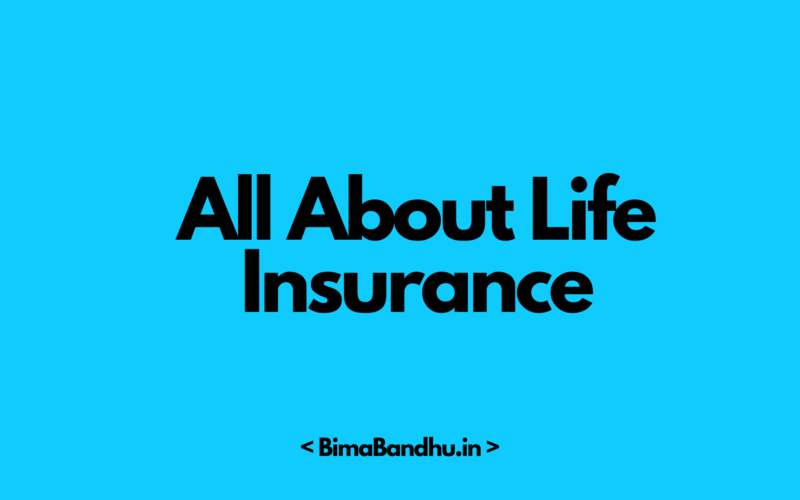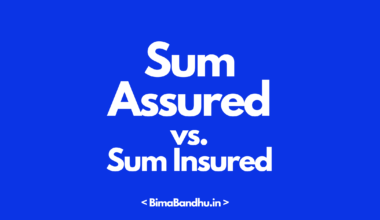Securing our lives is one of the primary responsibilities we all handle. Although we cannot control how long we will live, we can plan for a good life for ourselves and our family members with the help of a life insurance policy. If you want to secure your life, understanding various facets of life insurance and how it works is important before you make the buying decision.
Let’s start with the basics of a life insurance policy.
What is Life Insurance Policy?
In insurance terminology, a life insurance policy is a contract or agreement between the policyholder and an insurer. It offers significant financial coverage in the form of payouts to the life insurance policy nominee in case of the unexpected demise of the life insured individual. On the other hand, the policyholder or the insured accepts to pay a specific amount, known as life insurance policy premium regularly to the insurer.
The terms and conditions of a life insurance policy depends on the type of plan you have chosen. For instance, you can also opt for critical illness coverage with a life insurance policy as per your needs and health condition.
Why Should You Buy Life Insurance?
Life is uncertain and it is quite difficult to predict what will come to us in the next moment. A life insurance policy acts like a shield that can help you and your family financially in stressed times. You should buy a suitable life insurance plan to ensure a secure financial future for your loved ones and/or plan for your long-term goals in life.
With life insurance, you can have:
- Peace of mind
- Savings for the future
- A regular source of income post retirement
- Financial benefits in case of a critical illness
Need for a Life Insurance Policy
At its core, a life insurance policy provides financial coverage for any unexpected contingency associated with your life. This can be an event that leads to death, disability, or accident. Loss of human tendency to work or loss of life can happen to any individual, which ultimately destabilize the financial needs of the family. Although human life cannot be valued in monetary terms, the insurance companies determine an amount payable to the insured or life insurance policy nominee in case of an event covered under the policy.
This definite sum payable by the insurer as defined under a specific life insurance policy is known as sum assured.
The need for a life insurance policy can be realized by keeping in mind the following aspects:
- In case the insured passes away during the chosen tenure, a life insurance policy provides financial support to the family members.
- Life insurance benefits can be used to finance the educational needs of children.
- The critical illness coverage under a life insurance policy provides an income source to deal with the time when the regular income is reduced.
- Life insurance helps the insured’s family in maintaining their lifestyle without compromising on the monetary front.
13 Important Terms Related to Life Insurance Policies
A crucial part of gaining knowledge about a life insurance policy is to first understand the fundamental terms that are often used while referring to these policies. Lack of knowledge about these basic terms also refrain many people from buying a policy to secure their lives.
Given below are the key terms related to a life insurance policy you should know about:
1. Life Insured
It refers to the individual whose life is secured or protected under a life insurance policy. For example, when you buy a life insurance plan for yourself, you become the life insured.
2. Policyholder
An individual who buys a life insurance policy and pays its premium is the policyholder. You should also know that you become the policyholder if you buy it for any of your loved ones (who then becomes life insured).
3. Policy Period
The duration or time span for which a life insurance policy provides coverage to the life insured is known as the policy period, or sometimes policy tenure. The life insurance policy period may differ based on the type of policy chosen and its terms as defined by the insurer.
4. Policy Premium
It refers to the sum that you need to pay to keep the policy active during the policy period. Failing to pay the premium before the due date or during the given grace period may cause the policy to lapse.
5. Policy Nominee
Life insurance policy nominee is the person who is nominated to receive the payouts and other benefits of the policy in case of covered eventualities. Also referred to as a beneficiary, the nominee is to be selected at the time of buying the policy.
6. Sum Assured
As the name suggests, sum assured refers to the guaranteed amount that the insured will pay to the beneficiary in case the life insured passes away. The selection of sum assured requires careful analysis of your needs, liabilities, and financial goals in life.
7. Death Benefit
It is the benefit payable to the life insurance policy nominee in case of the unfortunate demise of the insured. You should also know that death benefit can be same or higher than the sum assured, including the rider benefits if any.
8. Maturity Benefit
It is the amount payable to the policyholder, not nominee at the end of the chosen policy tenure.
9. Grace Period
Grace period of a life insurance policy is the extended time given to the policyholder after the premium payment due date to pay the premium. Paying the premium during this period makes the coverage to continue as planned.
10. Free-look Period
Under this period after the policy purchase, you can return the policy if you are not comfortable with its certain terms and conditions. In such a situation, you will get the premium refund after the deduction of charges related to stamp duty, medical examination, and others.
11. Revival Period
Failing to pay the premium of a life insurance policy on time cause policy lapse. However, if you want to continue with it and get the financial coverage defined earlier, you get an option to reactivate the lapsed plan within a certain time-frame. This is known as revival period.
12. Life Insurance Policy Riders
The riders or add-ons are contingent benefits that you can choose over the base policy additionally by paying an extra premium. These amendments offer financial cover over and above the sum assured defined in the base life insurance policy.
13. Exclusions
Exclusions refers to the situations which are not covered under a life insurance policy. The insurer has a right to reject the claims filed based on the exclusions defined in a policy.
Also Read: All About Claim Settlement Ratio of Life Insurers
How Much Life Insurance Coverage Should You Choose?
One of the most common question that many policy buyers ask is about the amount of life insurance cover or sum assured. While deciding on the cover, it is important not to choose a random number. To make a well-informed decision to select life insurance policy coverage, keep the following factors in mind:
1. Your Income
This is important because you should be able to pay the premium of a life insurance policy with a specific sum assured without facing a burden. A basic thumb rule is to choose a sum assured which is at least ten times your income in a year.
2. Your Financial Liabilities
You should consider existing loans and debts while selecting life insurance coverage. This way, you can prevent these liabilities to fall upon your family members in case of your untimely demise. The sum assured should be large enough to cover such financial liabilities.
3. Your Goals in Life
Considering your financial goals like child’s education and marriage helps a lot in planning for uncertainties in life. The whole need of buying a life insurance policy is to help your loved ones avoid any financial crunch in your absence. Therefore, your life cover must factor in these goals while also keeping the inflation factor in mind.
Also Read: How to Use Life Insurance Premium Calculator?
4. Your Age While Buying a Life Insurance Policy
Different requirements come up at different life stages for almost every individual. Hence, you should consider your age while select the sum assured under a life insurance plan. If you are in your 20s, select a life cover of ten to fifteen times your annual income plus outstanding loans.
Selecting an adequate sum assured is not rocket science. After carefully assessing your needs based on these factors, you can easily zero in on the most suitable life cover. You can also use online life insurance premium calculators to understand how life cover varies as per different related factors.
Recommended Read: How to Compare Life Insurance Policies?
Benefits of Buying a Life Insurance Policy
The basic benefit of purchasing a life insurance policy is to protect your family in tough times resulting from an unfortunate event. For all breadwinners, safeguarding their dependents is essential. There is indeed, a long list of benefits while makes life insurance a must-have for everyone.
1. Death benefit
The life insurance policy nominee will receive the chosen sum assured in case of the untimely demise of the insured.
2. Utility as Loan Collateral
Not many people know that a life insurance policy can also be used as a collateral while borrowing loans. You can opt for a loan from a bank or an NBFC by using the policy as a collateral.
3. Return on Investment
You can also buy different types of life insurance policies with the intent of gaining substantial returns from your investment. Life insurance is also considered a safe investment option by many risk-averse investors.
4. Tax Benefits
Tax savings is one of the many reasons that make people buy a life insurance policy. Life insurance purchase makes you eligible for tax benefits under different sections of the Income Tax Act.
5. Financial Planning
Planning for your finances the right way through different life stages requires careful planning. It is where a life insurance policy can play a vital role to help you and your family live a financially independent life.
6. Guaranteed Income
Certain types of life insurance policies provide regular payouts, which work as a secondary income source for you.
What are the Different Types of Life Insurance?
Given below are some of the most common types of life insurance policy in India:
| Type of Life Insurance Policy | Benefits in Brief |
| Term Plans | Pure risk cover against various types of eventualities |
| Unit Linked Insurance Plans or ULIPs | Insurance benefits along with investment opportunities |
| Endowment Plans | Combined solution for life cover and savings |
| Moneyback Life Insurance Policy | Periodic returns along with life insurance coverage |
| Child Insurance Plans | Meant for securing child’s future |
| Retirement Insurance Plans | Helps in building retirement corpus |
| Whole Life Insurance | Life insurance cover till the age of 100 |
| Group Life Insurance | Life cover for a group of people under one life insurance policy |
Recommended Read: A Complete Guide to Child Insurance Plans
What are the Documents Required to Buy a Life Insurance Policy?
- Income certificate
- Address proof – Aadhar card, Voter ID Card, Passbook, Driving License etc.
- Identity proof – Aadhar card, Passport, Voter ID Card, PAN card
- Age proof
Frequently Asked Questions
Q1. Why does it make sense to buy life insurance?
Buying life insurance can help you provide for your family members in case of your untimely demise or loss of earning abilities. It provides protection to your loved ones financially in your absence. Depending on the type of life insurance you choose, you can also plan to save money to achieve your goal of financial stability.
Q2. Is buying life insurance necessary in life?
Life insurance purchase is not a necessary decision in life. However, it is a smart way to keep your family protected, particularly your dependents. You should consider it as an important part of life planning.
Q3. What is the monthly cost of life insurance on average?
Several parameters contribute to determining the exact life insurance premium. These include your financial needs, life cover you want to select, type of policy selected, age, health, occupation, and many others.
Q4. Is selecting a life cover of Rs. 50 Lakhs enough for every individual?
No specific sum assured is good for every individual. The best way to zero in on a specific life insurance coverage is to follow the thumb rule that says the sum assured should be ten to fifteen times your annual income.
Q5. Is there any maximum age limit specified to buy life insurance?
It is up to the insurer to select the maximum age limit in which an individual can buy a life insurance policy. In general, this limit lies somewhere around 75 years.
Also Read: 19 Life Insurance FAQs Answered






